Key takeaways:
- Mindful parenting emphasizes presence and emotional engagement, fostering deeper connections with children.
- Consistent health support is essential for a child’s overall development and well-being, impacting their confidence and social skills.
- Balancing discipline with empathy leads to more effective parenting, transforming discipline into opportunities for growth.
- Creating a nurturing environment through routines and emotional safety strengthens familial bonds and promotes emotional intelligence.
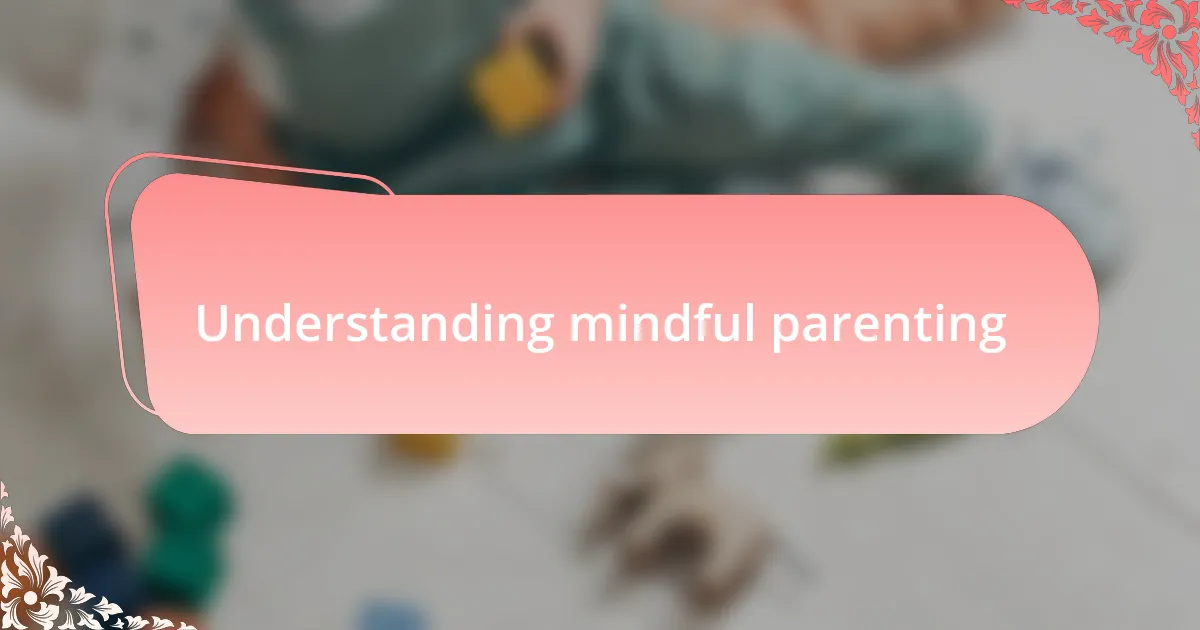
Understanding mindful parenting
Mindful parenting is about being present and fully engaged with your child, not just physically, but emotionally as well. I remember a day when my child called out from another room, and instead of just responding out of habit, I took a moment to pause. That brief silence allowed me to reconnect and truly listen to what they were saying, revealing all the emotions behind their words.
It’s easy to get caught up in the rush of daily life, but I often ask myself: how can I slow down and notice the little moments? Being mindful means recognizing that those moments, like when my child shares a worry or a joy, are precious opportunities for connection. This practice fosters deeper relationships and helps my child feel valued and understood.
The essence of mindful parenting lies in self-awareness and empathy. I have found that taking a minute to breathe before reacting allows me to respond thoughtfully rather than impulsively. Each time I practice this, it strengthens my bond with my child and creates a more nurturing environment, which is crucial for their emotional well-being.
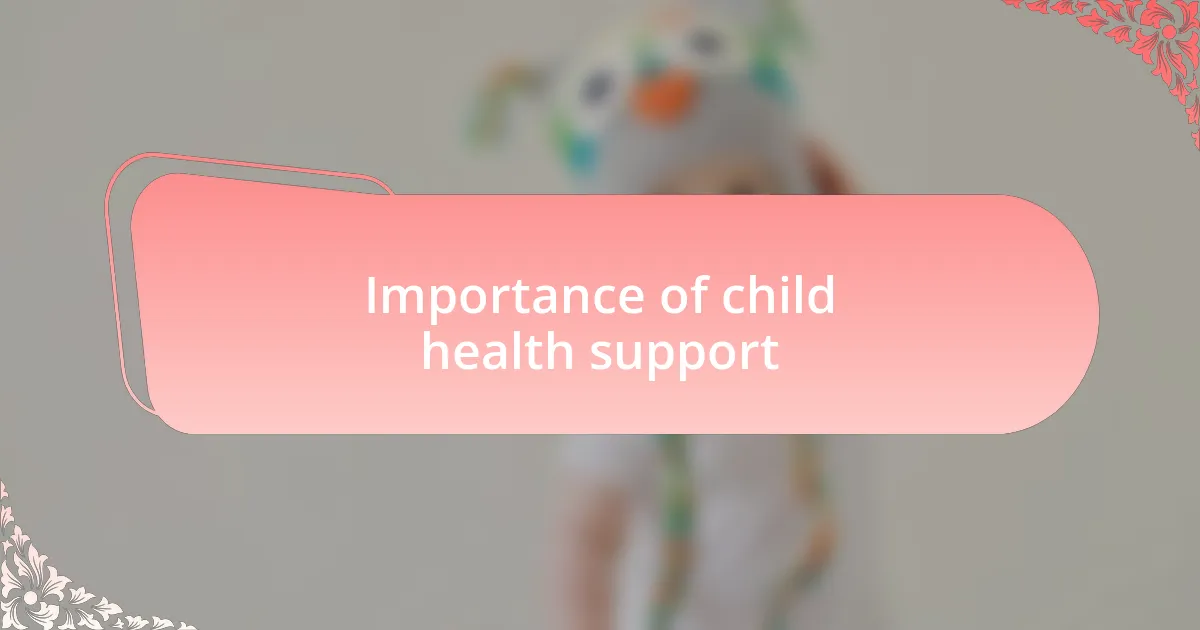
Importance of child health support
Child health support is fundamental because it lays the foundation for a child’s overall development. From my own experience, I’ve noticed that when I prioritize my child’s physical needs—such as regular check-ups and healthy meals—they thrive not just physically but emotionally too. Isn’t it fascinating how addressing basic health can influence mood and behavior?
Moreover, children who receive adequate health support are more likely to engage in social interactions and develop better cognitive skills. I remember taking my child to a community health fair where they could explore healthy foods and participate in fun activities. Seeing their enthusiasm reinforced the value of teaching them about health in an enjoyable way. It made me realize that when children feel nurtured and healthy, they are more confident in exploring the world around them.
Finally, consistent health support helps parents identify and address potential issues early on, which is crucial. I once overlooked my child’s persistent cough, thinking it was just a seasonal allergy. However, a timely visit to the pediatrician revealed a minor issue that was easily treatable. It dawned on me then how crucial it is to be vigilant and proactive about health, ensuring my child has the best chance to flourish.
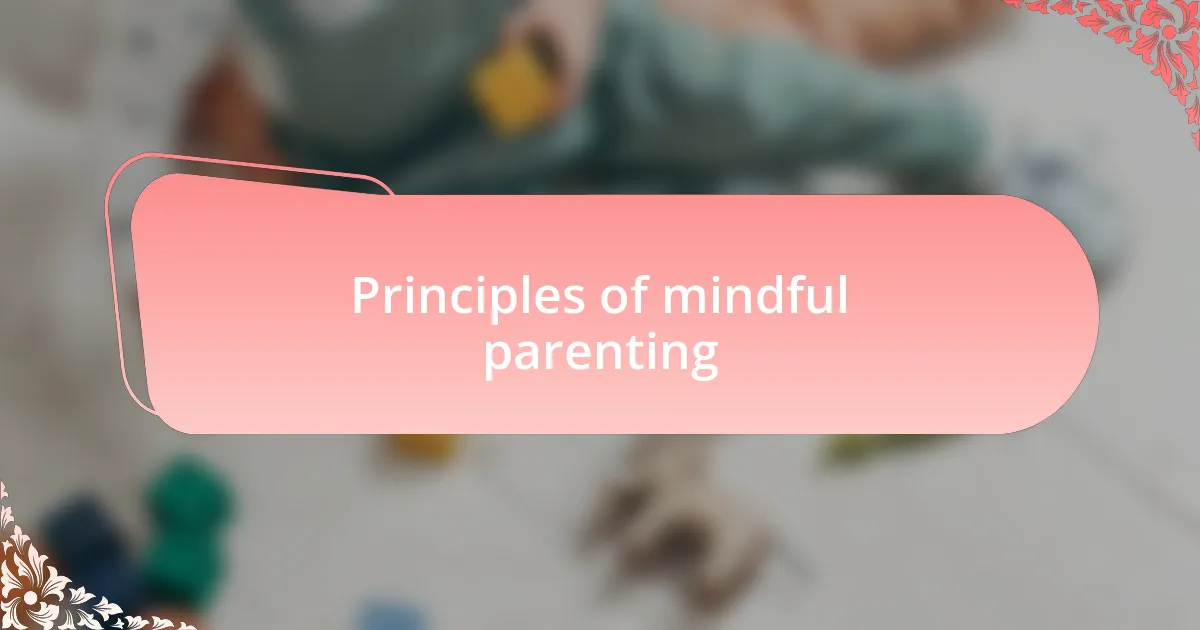
Principles of mindful parenting
Mindful parenting is rooted in the principle of presence; it means being fully engaged with your child in each moment. I recall a time when I was rushing through dinner preparation, distracted by work emails. My child, eager to share their day, looked up at me with a mix of excitement and disappointment. That moment reminded me that being present is vital for our conversations and connections.
Another key principle is non-judgmental observation. This involves watching your child’s behavior without immediately reacting. One afternoon, I noticed my child struggling with frustration while attempting to solve a puzzle. Instead of stepping in right away, I paused and observed, allowing them to express their emotions freely. This gave them the space to develop resilience, and I found it incredibly rewarding to see them overcome that challenge on their own.
Lastly, mindful parenting encourages a focus on emotional awareness. I’ve learned to tune into my own feelings and those of my child. When my little one seems upset, I make it a point to ask what they’re feeling instead of jumping to solutions. This practice not only strengthens our bond but also teaches them the importance of acknowledging their emotions. Have you had similar experiences that made you realize how crucial it is to understand feelings in parenting?
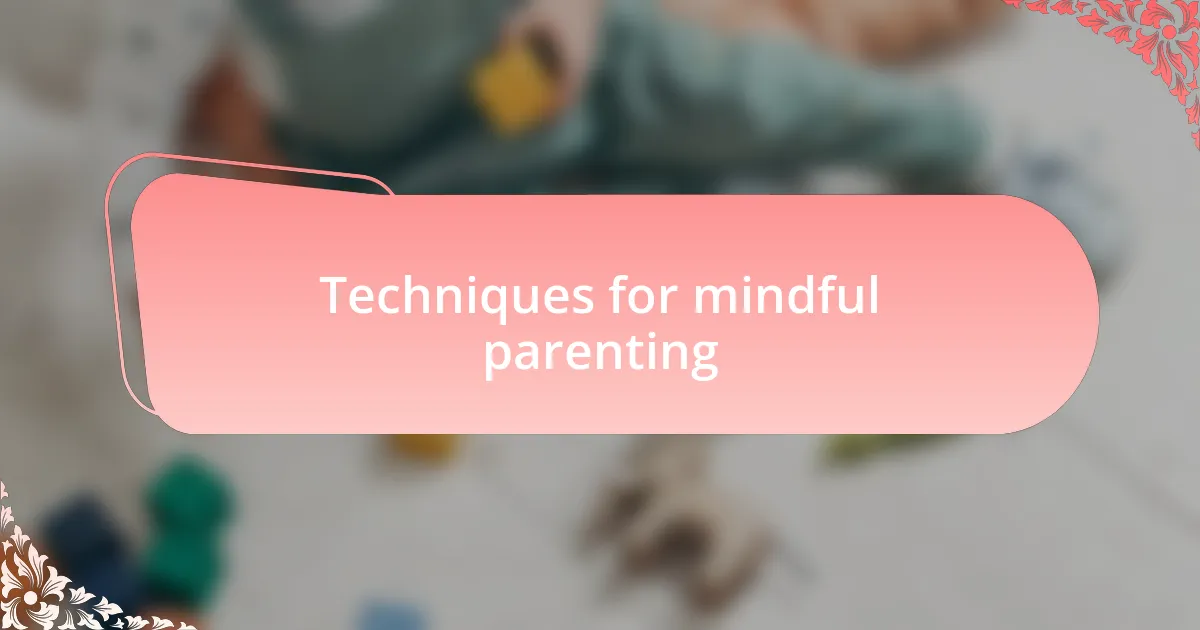
Techniques for mindful parenting
Techniques for mindful parenting can vary, but one effective approach is to practice deep breathing together. I remember a particularly chaotic morning when my child was upset about going to school. Instead of reacting to the chaos, I suggested we take a few deep breaths together. As we inhaled and exhaled, I noticed their demeanor shift from distress to calm. Have you ever tried this simple technique? It can really help ground emotions for both parent and child.
Another technique is setting aside dedicated time for one-on-one interactions. From my experience, these moments can be magical. I recall a Sunday afternoon when I took my daughter to a local park, unplugged from any devices. We explored nature, picked flowers, and talked about anything and everything. It was during these times that I discovered things about her interests and feelings that I never would have known otherwise. How often do we let distractions take away from these precious moments?
Lastly, incorporating mindful listening into daily life can transform communication. There was a time when my son hesitated to share his feelings about a friend situation at school. Instead of interrupting with advice, I focused on really listening. I found that by giving him my full attention, I was able to understand not only what he was saying but also the emotions behind his words. Doesn’t it feel empowering to simply be present for your child in those moments? It fosters trust and opens the door for deeper conversations.

Creating a nurturing environment
Creating a nurturing environment starts with making your home a safe haven, a place where every family member feels valued and heard. I remember how, after a particularly long day, I noticed my son looking withdrawn. I took a moment to sit beside him, asking what was on his mind. That simple act opened the door for a heartfelt conversation and reminded me how crucial it is to create spaces where emotions can flow freely.
Another key aspect of nurturing is consistency and routine. When my daughter was younger, we established a calming bedtime ritual that included reading together and sharing highlights of our day. This routine not only provided her with a sense of security but also strengthened our bond. Have you ever considered how your daily habits could provide a similar anchor for your children?
Lastly, I believe that promoting kindness and empathy is vital in nurturing a warm environment. I once facilitated a family volunteer day at a local shelter, and the impact on my children was profound. They saw firsthand the importance of giving back and began to articulate their feelings about helping others. How do you encourage your children to practice empathy at home? It’s these experiences that truly shape compassionate individuals.
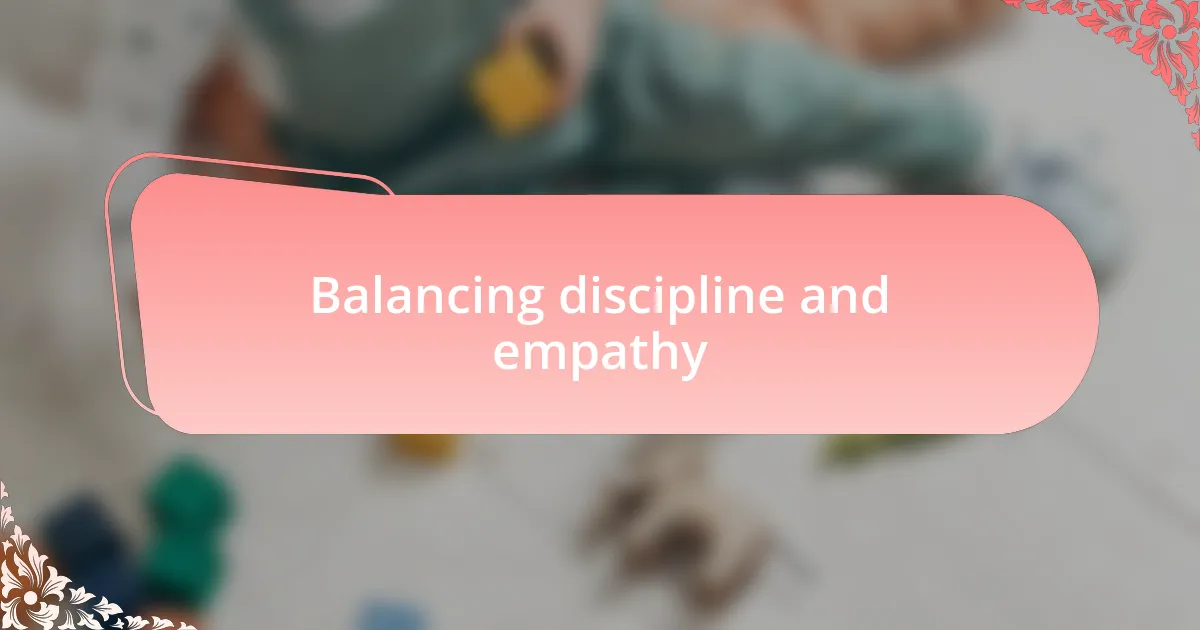
Balancing discipline and empathy
Finding the right balance between discipline and empathy can be challenging. I remember a moment when my son misbehaved at a family gathering. Instead of reacting with anger, I gently pulled him aside and asked him what happened. His response surprised me; he felt ignored amid the excitement. This interaction taught me that understanding a child’s perspective can lead to more effective discipline.
Empathy doesn’t mean letting kids off the hook; instead, it’s about instilling values while maintaining boundaries. Once, after my daughter broke a cherished vase during a play session, I felt the urge to scold her. Instead, I took a deep breath and reminded her of our agreement about keeping fragile items safe. This approach not only reinforced our rules but also showed her that I cared about her feelings. Have you noticed how balancing understanding with guidance can foster respect?
Ultimately, using a mindful approach to discipline can cultivate deeper connections with our children. When I shifted my focus from correction to conversation, I noticed my kids opened up more often. I’ve learned that when discipline is rooted in empathy, it transforms discipline from a chore into an opportunity for growth and understanding. How might your parenting change if you viewed discipline as an invitation for dialogue?

Personal experiences and reflections
I often reflect on the days when my daughter would have meltdowns over the simplest things, like a missed snack time. One evening, as I sat on the floor beside her, crying alongside her, I realized that being present in her emotions deepened our bond. I’m curious—how often do we rush to fix things instead of just sitting with them?
One particular instance stands out in my memory: my son, at three years old, was frustrated with a puzzle he couldn’t complete. I knelt beside him and encouraged him to try again, sharing my own experiences of failures before successes in my adult life. I saw a spark of determination ignite in his eyes as he attempted it again. How transforming can our experiences be when we share them with our children?
In moments of quiet reflection, I consider how these interactions shape not only my children’s emotional intelligence but also my own. One afternoon, I let go of my to-do list and spent hours creating art with them. That day, I was reminded that joy often arises from simply being present together. Have you ever wondered how these seemingly small moments can have a lasting impact on our relationships?